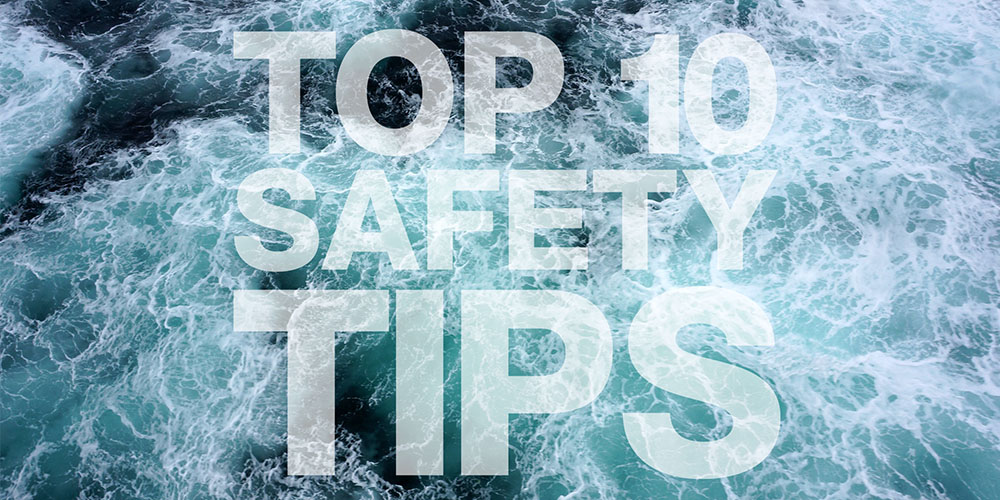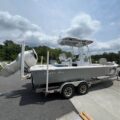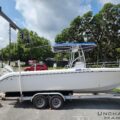Top Ten Safety Tips for New Boaters
By following these ten simple safety tips, you can ensure that every boating adventure is a fun and worry-free experience for everyone onboard. Stay safe and make the most of your time on the water!

Whether you’re a seasoned sailor or a first-time boater, safety on the water is paramount. Here are ten essential tips to ensure a fun and worry-free experience for everyone onboard:
- Life Jackets for All: Ensure everyone has a properly fitted, USCG-approved life jacket.
- Use Grab Rails: Utilize grab rails or jacklines for stability, especially in rough conditions.
- Be Aware of Hazards: Keep a sharp eye out for obstacles both on deck and in the water.
- Know Your Boat: Familiarize yourself with your boat’s operation, including safety features.
- Stay On Board: Wait until the boat is securely docked before moving around.
- Designated Driver: Just like on the road, designate a sober skipper.
- Required Safety Gear: Ensure all Coast Guard-mandated safety equipment is onboard and accessible.
- Anchoring Skills: Learn proper anchoring techniques to avoid drifting or damaging your boat.
- File a Float Plan: Let someone know your itinerary in case of emergencies.
- Take a Boating Course: Learn essential boating skills and safety procedures.
By following these simple guidelines, you can take personal responsibility for your safety, your crew, and your vessel, ensuring a safe and enjoyable boating experience.
Ensure everyone onboard has a properly fitted, U.S. Coast Guard-approved life jacket. Your life jacket is your most important piece of safety gear on the water.
Did you know that most boating fatalities are drownings, and most drowning victims weren’t wearing life jackets? That’s why at Uncharted Marine, we emphasize the importance of properly fitted life jackets for everyone on board.
We offer a wide selection of life jackets to suit your boating activities, from fishing and watersports to cruising. If you prefer a more comfortable option, consider an inflatable life vest – they’re so lightweight and unobtrusive, you’ll hardly notice you’re wearing one!
Your safety is our priority. Visit Uncharted Marine today to find the perfect life jacket for you and your crew.
One Hand for the Job, One Hand for the Boat!
Navigating a boat’s deck is vastly different from strolling on a sidewalk. Always prioritize stability by holding onto grab rails or other secure fixtures while moving around. On sailboats, jacklines offer an extra layer of protection against falling overboard, and they can be a valuable addition to powerboats in rough conditions. Remember, one hand for the task, one hand for the boat!
Be the Captain of “Your Ship”
As a boat owner, your responsibility extends to the safety of everyone onboard. While enjoying the sights and sounds of the water, be vigilant about potential hazards that could cause injury. Loose lines, open hatches, or exposed hardware are just a few examples of risks that can be easily overlooked.
Remember, boats are inherently dynamic environments, and even experienced boaters can encounter unexpected hazards. Encourage your guests to exercise caution and be aware of their surroundings, ensuring a safe and enjoyable experience for everyone.
Know Your Boat
As the captain of your vessel, it’s your responsibility to be prepared for any situation. Familiarize yourself with your boat inside and out:
- Emergency Procedures: Know how to handle rough weather, locate through-hull valves, and perform basic engine repairs.
- Crew Safety: Be confident in your ability to recover someone who falls overboard.
- Essential Equipment: Know the location of safety gear like fire extinguishers, VHF radios, medical kits, and tools – even in the dark.
By being prepared and knowledgeable, you can ensure a safe and enjoyable boating experience for yourself and your crew.
No Jumping Please!
When docking, remember that patience and proper procedure are key. Encourage your guests to stay onboard until the boat is securely tied to the dock. Heroic leaps may seem tempting, but they can easily lead to accidents and injuries. By taking a calm and controlled approach, you’ll ensure everyone disembarks safely and avoids any unnecessary risks.
Designate a Sober Skipper
Did you know that alcohol is a factor in nearly half of all boating accidents? Just like driving, it’s illegal to operate a boat with a blood alcohol content of .08% or higher in most states. The consequences of boating under the influence can be severe, both legally and personally.
Always prioritize safety by designating a sober skipper before enjoying alcoholic beverages on your boat. As the boat owner, you are responsible for the well-being of everyone on board, so ensure responsible behavior and avoid any actions that could lead to accidents or injuries.
Equip Your Boat with Essential Safety Gear
Boating safety starts with having the right gear. The U.S. Coast Guard mandates essential equipment such as life jackets, fire extinguishers, visual distress signals, and more. If you boat at night, navigation lights are also required.
We strongly recommend having a VHF radio onboard, as it’s a crucial communication tool in emergencies. Uncharted Marine offers a wide selection of handheld and fixed-mount VHF radios to suit your needs.
For a comprehensive list of required safety gear, consult the U.S. Coast Guard’s guidelines for recreational vessels. Stay safe on the water by being prepared and equipped!
Make Sure Your Boat Has an Anchor and Know How to Use It
Even if anchoring isn’t on your itinerary, unexpected situations can arise, like engine trouble or a rogue wakeboard rope tangling your prop. Be prepared by having the right anchor and rode for your boat and the waters you frequent. Ensure the rode is neatly stowed for smooth deployment. And remember – always secure the bitter end to your boat!
For a comprehensive guide on anchoring techniques and safety, check out our resource on anchoring securely.
Create a Float Plan a Give it to a Trusted Person
Before embarking on your boating adventure, inform a trusted friend or family member about your plans. Share a detailed itinerary, including your destination, expected return time, and any planned stops along the way. This “float plan” allows them to notify the Coast Guard or other authorities if you encounter unexpected delays or emergencies.
Take a Boating Class
Enhance your boating knowledge and skills with courses from the US Coast Guard Auxiliary or US Power Squadron! These organizations offer a wide variety of classes for both new and seasoned boaters, covering topics like radio communication, navigation, boating law, safety equipment, and more.
As a bonus, joining these organizations opens doors to social events and the rewarding opportunity to support the Coast Guard in promoting boating safety. Invest in your boating education and become a more confident and responsible boater.


